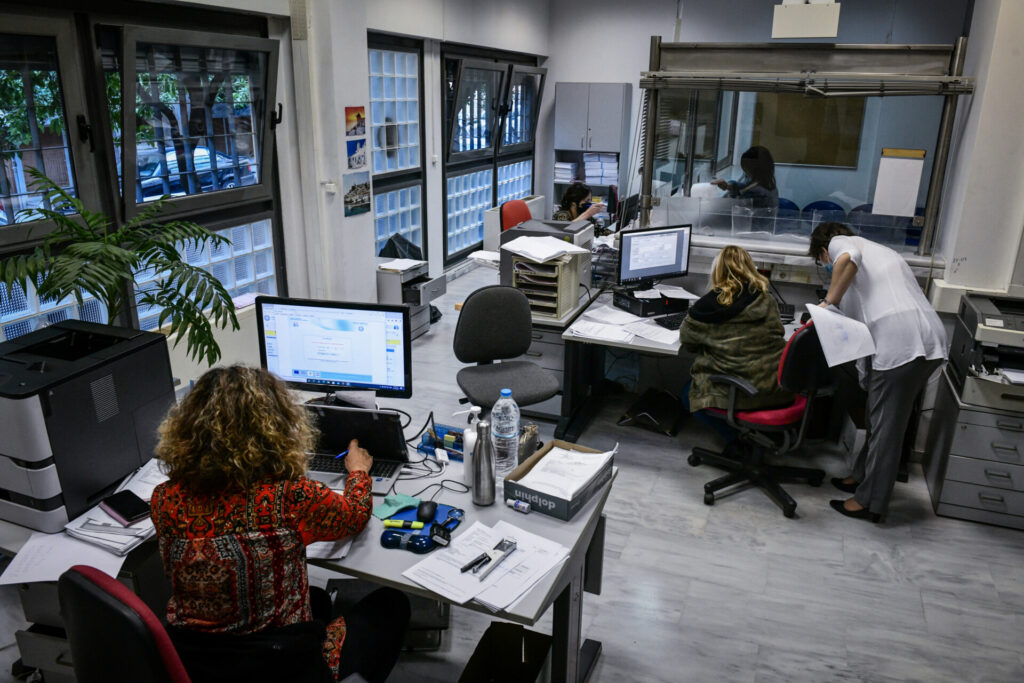Public sector employees are preparing for new salary increases expected to take effect from April 1st. According to the Finance Ministry’s planning, the horizontal salary enhancement will range around 35-40 euros gross monthly, bringing a net annual increase of approximately 250 euros. The salary improvements in the public sector are directly linked to the minimum wage trajectory in the private sector.
Key features of new public sector salary increases
According to information from Apogeumatini and Giorgos Autias, the new salary policy for the public sector includes significant changes affecting all levels. The horizontal salary increase will apply to all public employees regardless of grade or specialty. Additionally, the starting salary in the public sector is expected to reach 950 euros by 2027, following the minimum wage adjustment.
The fiscal cost for a monthly 30-euro increase from April is calculated at 215 million euros total, while without employer contributions it amounts to 179 million euros.
Long-term salary increase planning
With the completion of the minimum wage increase plan to 950 euros by April 2027, public employees will receive an additional 70 euros over the next two years. The total salary improvement compared to 2024 will amount to 100 euros monthly or 1,200 euros annually.
When the increase plan is completed at the end of the four-year term, the annual cost will reach 792 million euros without employer contributions and a total of 954 million euros with employer contributions.
Existing improvements in public sector salaries
Since last year, significant salary and benefit increases have already been implemented. Specifically, all public employees’ salaries were enhanced by 70 euros monthly, while family allowances increased by 20-50 euros. Additionally, position of responsibility and border area allowances were enhanced by 30%.
Special interventions were made to the special salary scales of doctors, uniformed personnel, university faculty members, and judicial staff. Simultaneously, travel expenses were increased and autonomous taxation of doctors’ on-call compensation in the National Health System was implemented at a cost of 40 million euros.
Contribution reductions and additional benefits
From January 1, 2025, a 1-point reduction in insurance contributions applies to the public sector as well. Of the 440 million euros total cost of the reduction, 83 million euros concerns the public sector.
Significant is the regulation for non-offsetting of public employees’ personal difference during their salary evolution, provided it amounts to up to 300 euros. The measure affects approximately 40,000 public employees with an annual cost of 12 million euros.
Special enhancements for uniformed forces
From July 1st, Armed Forces and Security Corps personnel were enhanced with the special working conditions and hazard allowance. The 156,000 uniformed personnel receive a 100-euro monthly enhancement, with estimated total cost of 111 million euros for 2025 and 222 million euros for 2026.
Additionally, night compensation for uniformed personnel increased from January 1, 2025, with an annual cost of 25 million euros. The performance incentive achievement in the public sector was also expanded with an annual cost of 40 million euros.
Overall assessment of salary interventions
The total fiscal cost of interventions from 2023 to 2025 is estimated at 2.07 billion euros, while the total public sector salary cost is 18.8 billion euros.
In total, 15 permanent salary increases have been received by public employees from the New Democracy government over the past two years, including:
- Restructuring of National Health System doctors’ salary scale in 2023 with 10% average increase
- Abolition of the special income solidarity contribution from 2023
- Currently addressing armed forces salary issues, such as:
-Salary evolution of Long-Term Volunteers and Short-Term Reclassification Soldiers
-Extension of 5-year Combat service for uniformed personnel to other staff categories.
-Decision issuance for payment of special compensation for night employment of Armed Forces personnel (25 million euros).
-Establishment of special additional compensation for warship crews on missions, with total cost of 59 million euros.
- Abolition of 1% contribution to Public Employees Welfare Fund
- Horizontal salary increase by 70 euros with cost of 558 million euros (674 million euros with employer contributions).
- Family allowance increase in public sector by 20-50 euros with cost of 155 million euros (187 million euros with employer contributions).
- Position of responsibility allowances increase by 30% with cost of 52 million euros (62 million euros with employer contributions).
- Border area allowance increase by 30% with cost of 8 million euros (9 million euros with employer contributions).
- 15-euro increase in special working conditions allowance for married uniformed personnel or those with children, costing 20 million euros.
- University faculty salary restructuring, retroactive from 07/10/2022, with 10% average increase, annual cost of 41 million euros (49 million euros with employer contributions).
- Increase from 1/1/2024 of travel and accommodation allowances with annual cost of 43 million euros.
- Increase of compensatory allowance and fixed remuneration for judicial staff, with annual cost of 15 million euros.
- 20% increase in National Health System on-call compensation, with annual cost of 45 million euros.
- Additional increase in special compensation for warship crews and Armed Forces personnel on special missions, with annual cost of 15 million euros.
- Increase in doctor attraction incentive for problematic and remote areas, with annual cost of 16 million euros.
Public sector salary increases are part of a broader strategy to improve working conditions and competitiveness in the public sector.




